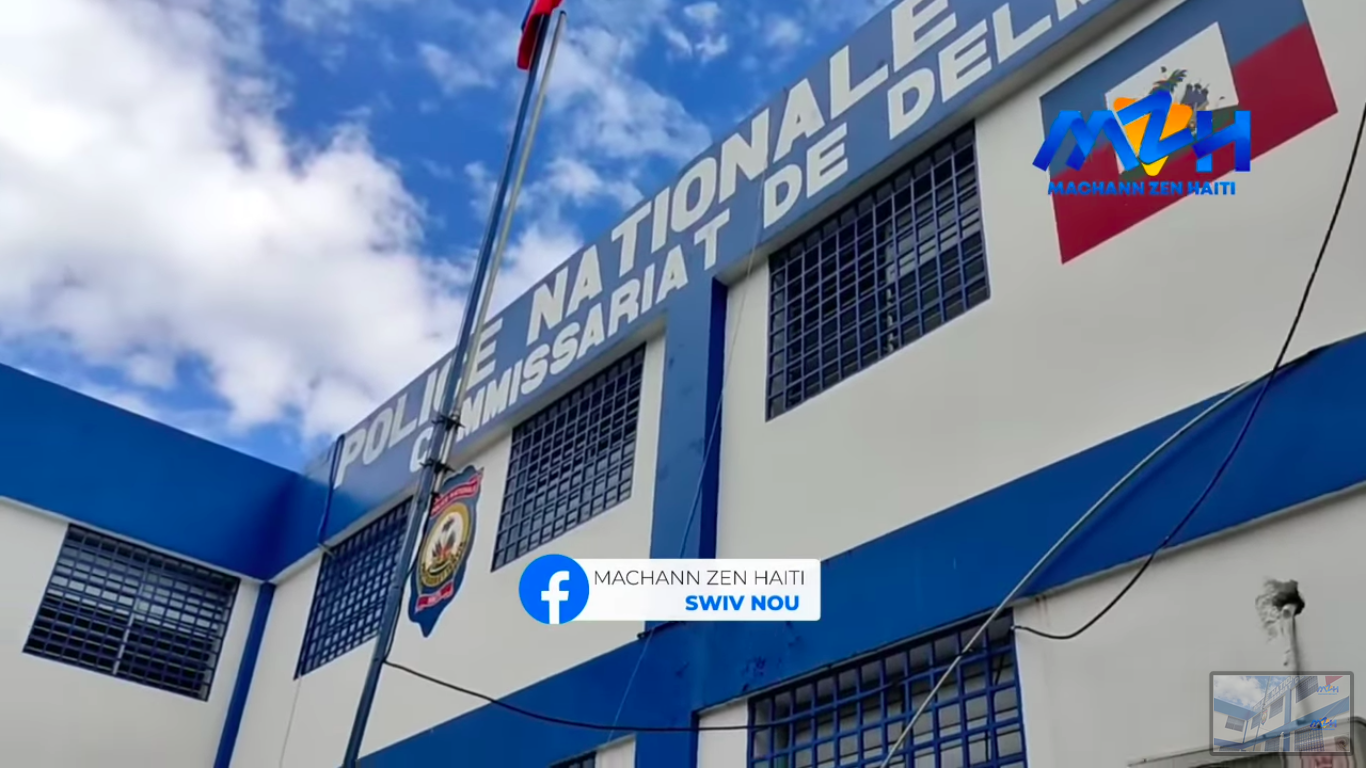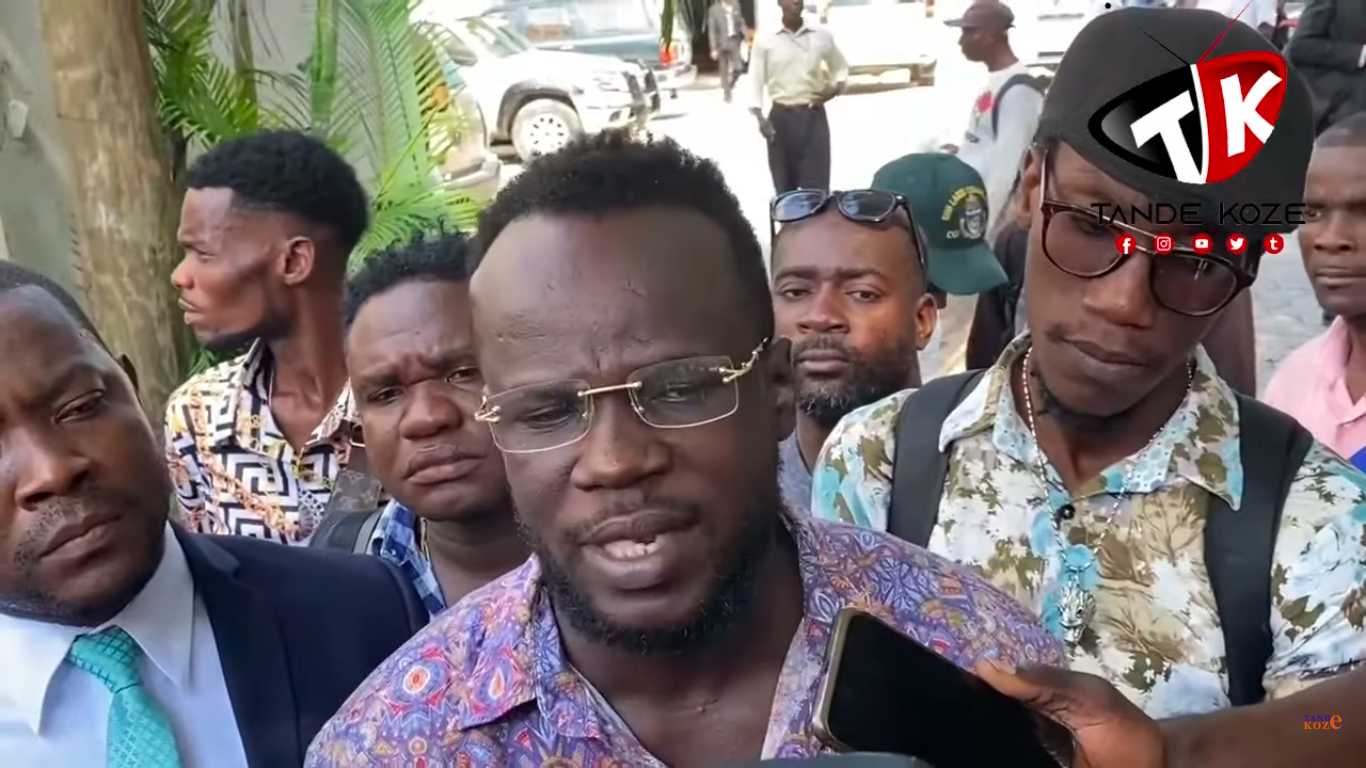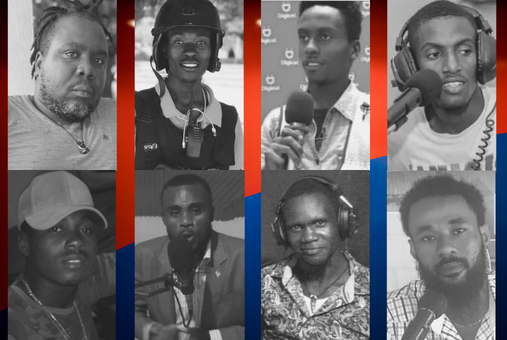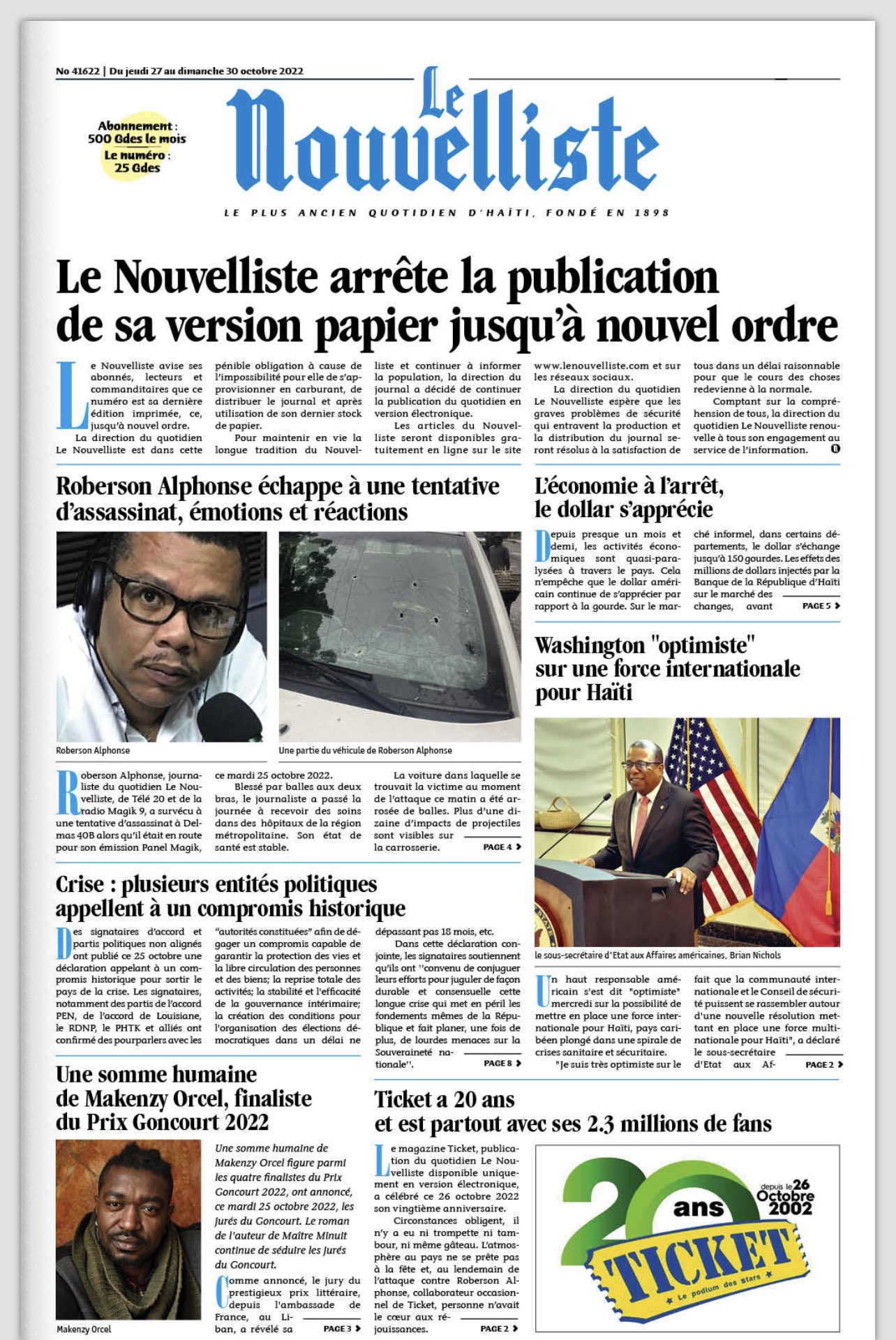*This article has been updated to include the murder of Fritz Dorilas on November 5.
On the morning of Sun. Oct. 30, Romelson Vilcin was outraged by the arrest of his colleague Robeste Dimanche, who had been detained and beaten by members of the Haitian National Police (HNP) earlier that day while on his way to cover a protest.
Vilcin, who worked as a reporter for the digital radio station Génération 80 and contributed to the local media SpotLight in the Haitian district of Port-de-Paix, alerted his colleagues via his Facebook account about Dimanche's arbitrary detention. Minutes later he went to the HNP station at Delmas 33 Street in the Haitian capital, Port-au-Prince, where other journalists and activists were already gathered to demand Dimanche's release.
Tension at the site escalated and agents inside the station attempted to disperse the "hostile crowd" trying to enter the premises with tear gas. One of the tear gas canisters hit the left side of Vilcin's head, according to the police version. The journalist was taken to Bernard Mevs Hospital, where he died about three hours later.

Journalist Romelson Vilcin was killed at the Haitian National Police station in Port-au-Prince where his colleague Robeste Dimanche was detained. (Photo: Screenshot of Machann Zen HAÏTI on YouTube)
"The high command of the HNP expresses its condolences to the family, to the members of the press, in particular those of Jim Studio, Zenyez TV and Génération 80 Radio, as well as to all those affected by this unexpected disappearance," the institution said in a statement dated on the same date of Oct. 30. "Likewise, it takes this opportunity to inform the public in general and members of the press in particular, that instructions have been given to the General Inspectorate of the HNP to conduct an investigation into this event to determine the circumstances and to set, if necessary, responsibilities."
However, some witnesses present at the protest, including journalist Reynald Petit-Frère, president of the Haitian Online Media Collective (CMEL, by its French acronym), and Richard Pierrin, an AFP photographer, claimed that some officers had opened fire on the crowd.
"Romelson Vilcin was shot dead in the courtyard of the Delmas 33 police station. A policeman who lost control of his machine gun opened fire in Romelson's direction while others shelled us with tear gas. Several other press workers were brutalized by the police," Petit-Frère said on the Panel Magik radio program on Mon., Oct. 31, according to Le Nouvelliste.
Images circulating on social media showed Vilcin's motionless body on the floor, face down and with his right arm bent and blood dripping from his head.
"SpotLight de Port-de-Paix has learned with great sadness of the death of its reporter, journalist Romelson Vilcin, who was shot inside the premises of the Delmas 33 station while showing support for journalist Robeste Dimanche, arrested by the HNP. The entire team of the newspaper believes that journalist Romelson Vilcin will somehow find justice," the newspaper published on its social media channels.
A few days earlier, Vilcin had taken to his Facebook profile to comment on the attempted assassination of fellow journalist Roberson Alphonse, a reporter for the Le Nouvelliste newspaper and contributor to Télé 20 TV and radio Magik9. Alphonse was ambushed by gunmen on Oct. 25 in the streets of Port-au-Prince on his way to work.
The assailants fired at point-blank range at the journalist's car, who made it out alive from the attack. With gunshot wounds to one arm, Alphonse managed to drive himself to a hospital, where he was later reported as stable.
Dimanche, a reporter for Radio Télé Zénith and spokesman for the CMEL, was released on Oct. 30 after more than 10 hours in police custody. The journalist said that agents of the Departmental Unit of Forces of Order (UDMO, for its French acronym) put him in a patrol car around 9:30 am on Sun., Oct. 30, and beat him with their weapons on different parts of his body, especially on the head.
"After picking me up, they moved across several streets in Delmas before deciding my fate. In the back of the vehicle, one of them suggested executing me in [the commune of] Cité Soleil. They finally took me to the Delmas 33 police station, where I spent more than ten hours in police custody," Dimanche told Le Nouvelliste.
Vilcin, Dimanche and Alphonse are just the most recent victims of a wave of attacks on members of the press that have been recorded in recent months in Haiti. So far in 2022 alone, eight journalists have been killed in this Caribbean country, while several more have been assaulted or arbitrarily detained for practicing their profession.
Both national and international organizations have expressed their condemnation of these acts of violence against the press. They have called for justice and security for journalists so they’re able to practice their profession.
Unesco's Director General, Audrey Azoulay, condemned Vilcin's murder and called for a clarification of the events in which the journalist lost his life.
“I condemn the killing of Romelson Vilcin. Journalists must be free to attend and report on events of public interest without fearing for their safety. I call on the authorities to investigate the circumstances of Mr Vilcin’s death and ensure those responsible are held accountable,” Azoulay said in a statement sent on Nov. 3.
Reporters Without Borders said it was horrified by the frequency with which journalists are being killed in Haiti. The organization called on Nov. 3 for urgent measures to ensure that journalists can work safely without being targeted.

Robeste Dimanche, a reporter for Radio Télé Zénith, was detained for more than 10 hours after being beaten on board a police vehicle. (Photo: Screenshot of Tande Koze on YouTube)
“It is incomprehensible that a journalist could be killed by a police officer while outside a police station demanding the release of a fellow-journalist who had been arrested for doing his job,” said Artur Romeu, director of the Latin America office of Reporters Without Borders. “The authorities must put a stop to the violence against journalists in Haiti. Their inaction and the resulting feeling of impunity are leading to more and more attacks.”
According to Reporters Without Borders, 2022 is the year with the highest number of journalists murdered in Haiti in two decades.
On October 27-30, the Inter American Press Association (IAPA) approved a resolution on Haiti at its 78th General Assembly. The resolution stresses that the climate of violence and the political, economic and security crisis in which the country finds itself keep journalists in a situation of defenselessness and at high risk.
"[The Assembly decided] To call on the government [of Haiti] to guarantee the preservation of freedom of expression and the free and safe exercise of journalism. To urge the press organizations of the Americas to express their solidarity and support for journalists and news outlets that continue to carry out their news mission despite high-risk circumstances," the IAPA said in its resolution.
The International Federation of Journalists (IFJ) also condemned the events and demanded the implementation in Haiti of the Convention for the Safety and Independence of Journalists, to prevent media workers in that country from continuing to be in danger.
"This year, the violence that plagues Haiti has already left six press workers dead, who were victims of both organized crime groups and the police. The police, far from guaranteeing safety and integrity, have become an additional risk factor for journalists," the organization said in a statement. "In this context of the crisis, the role of journalists is vital to make known the reality that the Haitian people are going through and this task cannot be carried out in freedom without safe working conditions".
The Association of Caribbean Media Workers (ACM) called for a prompt and thorough investigation leading to the criminal prosecution of those responsible for Vilcin's murder. It also called on the authorities to put an end to violent practices against press workers in the course of their work.
“We are particularly concerned that in the current climate of pervasive criminal violence, there has seemingly been no attempt to ensure that the work of the free press is observed and protected,” the organization said in a post.
A week before Vilcin's murder, authorities in the southern Haitian city of Les Cayes announced on Mon., Oct. 24, the discovery of the body of radio broadcaster Garry Tess, who had been reported missing on Oct. 18. Tess was a political analyst on the radio program "Grand Lakou" on Radio Lébon FM in Les Cayes.
The CMEL detailed that Tess' remains were found under a bridge at a port construction site in the neighborhood known as Foko. In an Oct. 25 press release, the organization pointed out that, according to its own analysis and according to testimonies of the journalist's relatives, the government commissioner in Les Cayes, Ronald Richemond, and the director of the police in the region, Daniel Compère, were behind Tess's disappearance.
Richemond denied any responsibility in the facts and reminded the press that Tess had a track record related to a conflict over the sale of a piece of land. The Committee to Protect Journalists (CPJ) condemned the incident and said it will investigate whether the journalist's death was related to his work.

Amady John Wesley, Wilguens Louissaint, Tayson Lartigue, Frantzsen Charles, Maxihen Lazarre, Garry Tess, Romelson Vilcin and Fritz Dorilas are the press members who have been killed so far in 2022 in Haiti. (Photo: Facebook profiles)
Fritz Dorilas, of Tele Radio Megastar, was added to the journalists murdered this year. He was killed on Nov. 5 in a crossfire among rival gangs in Port-au-Prince, according to local media. However, other media reported that Dorilas was forcibly removed from his home and later executed during the clashes, according to IAPA.
Frantzsen Charles and Tayson Lartigue were killed and subsequently burned to death on September 11 while reporting in the Cité Soleil commune, which has been the scene of a bloody confrontation between gangs.
Earlier this year, photojournalist Maxihen Lazarre died of gunshot wounds to the stomach while covering a textile workers' protest on Feb. 23. Witnesses claimed the shots were fired by police officers.
On Jan. 6, Wilguens Louissaint and Amady John Wesley also died from gunshot wounds while covering gang conflicts in the Petion-Ville neighborhood of Port-au-Prince. Wesley worked for the Canadian station Radio Écoute FM, while Louissaint was a reporter for the digital media Tele Patriote and Tambou Verite.
It is not only violence and police brutality that prevent journalists in Haiti from practicing their work freely. Multiple factors of the political and social crisis in the country have also wreaked havoc on the exercise of press freedom.
Godson Lubrun, president of the Haitian Association of Online Media (AHML), described the situation of the media in his country as "chaotic." The journalist told EFE that, since 2010, dozens of colleagues have left the country to seek refuge in the United States, Canada and the Dominican Republic due to insecurity, poor working conditions and poverty.
Water and fuel shortages have directly affected the media. The Le Nouvelliste newspaper announced in October of this year the temporary closure of the publication of its paper version, due to the fuel crisis.

In its Oct. 27 issue, Le Nouvelliste newspaper announced both the temporary closure of its paper version and the killing attempt on journalist Roberson Alphonse. (Photo: Twitter @nouvelliste)
"The management of the daily Le Nouvelliste finds itself in this painful obligation, due to the impossibility of stocking fuel, distributing the newspaper and after exhausting its last stocks of paper," the news outlet announced this past Oct. 27. This was the only printed daily in Haiti and the oldest French-language newspaper on the continent, founded in 1898.
Due to the crisis in the media, many Haitian journalists are becoming freelancers or working as freelancers for foreign media, although these types of jobs are not enough to support themselves.
"Opportunities for freelance journalists in Haiti are minimal, [...] because there are very few local news outlets that assign freelance work. This is a situation that weakens freelance journalists economically," Milo Milfort, editor-in-chief of the Haitian investigative media Enquet'Action, told the International Journalists Network (IJNET).
The ACM complained that there has been no attempt by the authorities to guarantee respect for and protection of the work of the press. It also said that the suspension of the print version of Le Nouvelliste is a direct consequence of that indifference.
"The ACM shares the deep concern of all Caribbean journalists about the deteriorating situation in Haiti and its impact on the practice of independent journalism," the organization said. "Our courageous colleagues have our full support, and we encourage the promotion of diplomatic and other regional efforts that can have the impact of bringing the situation under some measure of control."